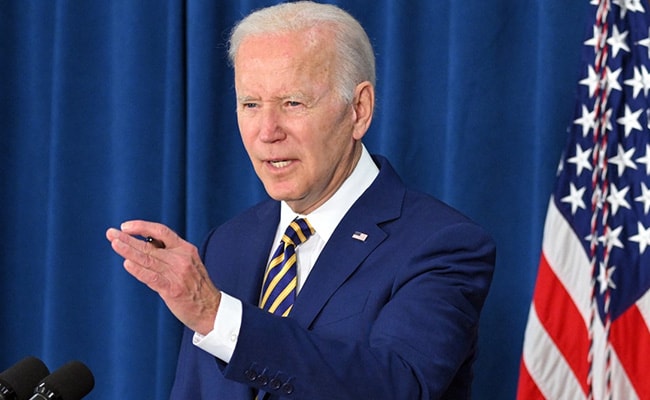
[ad_1]

Talks between Iran and the most important powers resumed final 12 months at Biden’s impetus.
Washington:
A flare-up in tensions between the UN nuclear monitor and Iran this week has left US President Joe Biden in an more and more tight jam.
The US chief opened his presidency with a pledge to return to the 2015 worldwide settlement that aimed to stop Tehran from constructing nuclear weapons, after predecessor Donald Trump unilaterally withdrew from it.
Negotiations to revive that settlement have been at an deadlock for 3 months over the final particulars.
Without a deal — and Iran ever nearer to nuclear “breakout” — Biden has a tricky alternative: to make extra concessions to Tehran, and be accused of weak spot by Republican opponents forward of midterm elections, or declare the talks useless, which might spark a brand new Middle East disaster.
Rafael Grossi, head of the International Atomic Energy Agency, stated Thursday that Tehran’s elimination this week of 27 cameras monitoring its nuclear websites might deal a “fatal blow” to negotiations.
“At this stage, things can go either way,” stated Ali Vaez of the International Crisis Group. “The tension of the past few days could potentially stir leadership in Tehran and Washington to take the deal that is on the table.”
Or, he stated, “It’s the first step in another cycle of escalation, and from this point on it would only get worse.”
“Worse” might imply Tehran shifting forward to construct a nuclear weapon, and its opponents like Israel and US hardliners demanding laborious motion to stop that.
Verge of a deal
The talks in Vienna between Iran and the most important powers resumed final 12 months at Biden’s impetus, with the US keen to rescind sanctions in trade for Tehran returning to full implementation of the 2015 Joint Comprehensive Plan of Action (JCPOA).
But on the fringe of a deal three months in the past, the talks stalled, due — in line with US officers — to ultimate calls for by Iran unrelated to nuclear points.
Meanwhile, officers say, Iran has pushed forward with uranium enrichment operations that take it near a weapons functionality.
The scenario deteriorated this week when members of the IAEA censured Iran for not cooperating. A day later Iran eliminated the 27 cameras.
Call for ‘most stress’
Supporters say the deal is the one factor that has prevented Iran from constructing nuclear weapons, and that saving it’s value Biden giving Tehran some concessions.
But opponents — Republicans, and robust supporters of Iran’s nemesis Israel — say Iran’s lack of cooperation reveals the settlement will not be value pursuing.
If Tehran’s accelerated uranium enrichment operations “are not sufficient to get the Biden administration to change course, what will?” requested Behnam Ben Taleblu of the Foundation for Defense of Democracies think-tank, which has opposed the JCPOA.
“The time has come for a multilateral version of maximum pressure,” he stated, referring to Trump’s method.
Even amongst Biden’s Democratic Party, some voices are rising impatient.
“At what point will the administration acknowledge that Iran’s nuclear advances make a return to the 2015 JCPOA not in the United States’ strategic interest?” stated Senator Bob Menendez.
‘Unsustainable’ limbo
Vaez says that the Biden administration has settled into the scenario of getting neither an settlement nor a disaster over it.
“The developments of the past 48 hours have basically demonstrated to both sides that the status quo in the past three months of no deal, no crisis is really not sustainable,” stated Vaez.
Yet Washington hasn’t set a deadline. On Thursday Secretary of State Antony Blinken solely warned that the elimination of the monitoring cameras threatened JCPOA restoration.
“The only outcome of such a path will be a deepening nuclear crisis and further economic and political isolation for Iran,” Blinken stated.
Instead of a tough line, the highest US diplomat stored the door open.
Returning to the deal “would still achieve our most important and urgent nonproliferation goals and would be strongly in our national security interests,” stated a Blinken spokesperson.
Randa Slim, a researcher on the Middle East Institute in Washington, known as the deadlock a state of limbo “whereby everybody will assume that the Vienna talks have collapsed, but nobody will be willing to announce it.”
That is Biden’s dilemma, she stated.
If they declare the talks over and conclude that Iran has imminent nuclear weapons functionality, Washington might be pressured into taking direct motion towards Iran, or supporting such motion by Israel, stated Slim.
“There are two clocks ticking …. putting a lot of pressure on the Biden administration,” stated Vaez.
One is the clock on Tehran’s precise nuclear know-how advances, he stated.
“And then there’s the political clock,” of the congressional elections in November that would deeply erode Biden’s political clout.
(Except for the headline, this story has not been edited by NDTV workers and is printed from a syndicated feed.)
[ad_2]